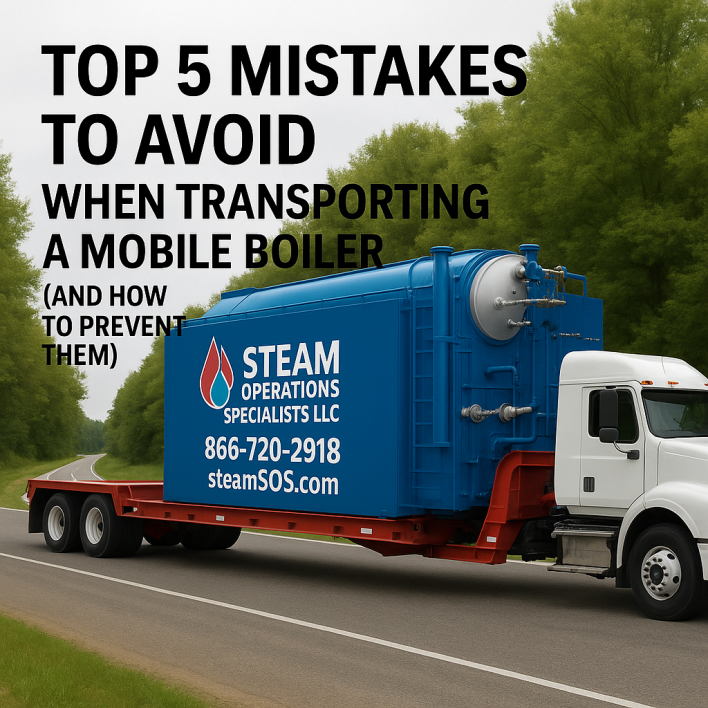
Top 5 Mistakes to Avoid When Transporting a Mobile Boiler (and How to Prevent Them)
Transporting a mobile boiler is no small task—it requires planning, precision, and an understanding of the risks involved. A small oversight can lead to costly damage, safety hazards, or even regulatory violations. To help you navigate this process smoothly, here are the top five mistakes to avoid when transporting a mobile boiler, along with practical tips on how to prevent them.
1. Leaving Stacks Up During Transit
One of the most common and dangerous mistakes is transporting a boiler with its stacks still upright. Not only does this create a serious tipping hazard, but it can also damage the stacks themselves or nearby infrastructure like bridges and power lines.
How to Avoid It:
- Always lower and secure stacks before moving.
- Use proper lifting equipment and follow the manufacturer’s guidelines for disassembly.
- Double-check that all stacks are stowed before departure.
2. Failing to Secure the Boiler Properly
Improper tie-downs or insufficient bracing can cause the boiler to shift during transport. This can lead to structural damage, road accidents, or violations of DOT safety regulations.
How to Avoid It:
- Use heavy-duty chains, straps, and blocking to immobilize the boiler.
- Follow load securement standards set by the Federal Motor Carrier Safety Administration (FMCSA).
- Conduct a walkaround inspection before hitting the road.
3. Ignoring Weight and Clearance Restrictions
Mobile boilers are heavy and tall, which means they can easily exceed road weight limits or run into clearance issues under bridges and overpasses. Overlooking these restrictions can result in fines, delays, or accidents.
How to Avoid It:
- Weigh the boiler and transport vehicle before travel.
- Plan your route using a truck-specific GPS that accounts for height and weight restrictions.
- Obtain the necessary oversize/overweight permits in advance.
4. Neglecting to Drain and Prepare the Boiler
Transporting a boiler that hasn’t been properly drained or depressurized can cause leaks, water damage, or dangerous pressure build-ups during transit.
How to Avoid It:
- Fully drain the boiler of water and fuel before transport.
- Ensure all valves are closed and capped.
- Depressurize the system and disconnect all utility connections.
5. Overlooking Pre-Trip Inspections and Documentation
Skipping inspections or failing to carry the right paperwork can lead to compliance issues and unnecessary downtime. Even if the boiler is properly secured, missing documentation can halt your transport.
How to Avoid It:
- Perform a pre-trip inspection checklist covering brakes, lights, tires, and securement.
- Carry all required permits, insurance, and equipment documentation.
- Keep a log of inspection results in case of roadside checks.
Transporting a mobile boiler doesn’t have to be stressful. By lowering stacks, securing the load, respecting weight and clearance limits, preparing the boiler properly, and staying compliant with inspections and paperwork, you can ensure a smooth and safe journey. The key is preparation—when every step is carefully planned, the risks drop dramatically, and your boiler arrives ready for action.
Ready to keep your operations running smoothly, no matter what? Contact Steam Operations Specialists today and discover the peace of mind that comes with the industry’s best boiler operations service.
.jpg?token=6445a83d8d25ab95bafc9ca7f56de5ee)